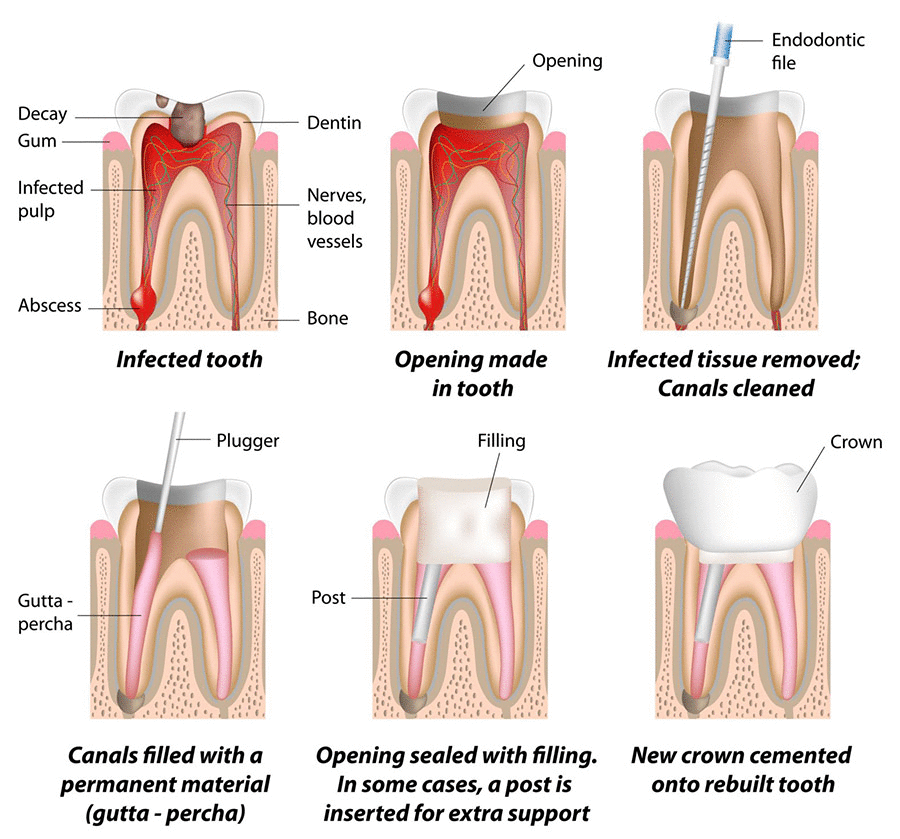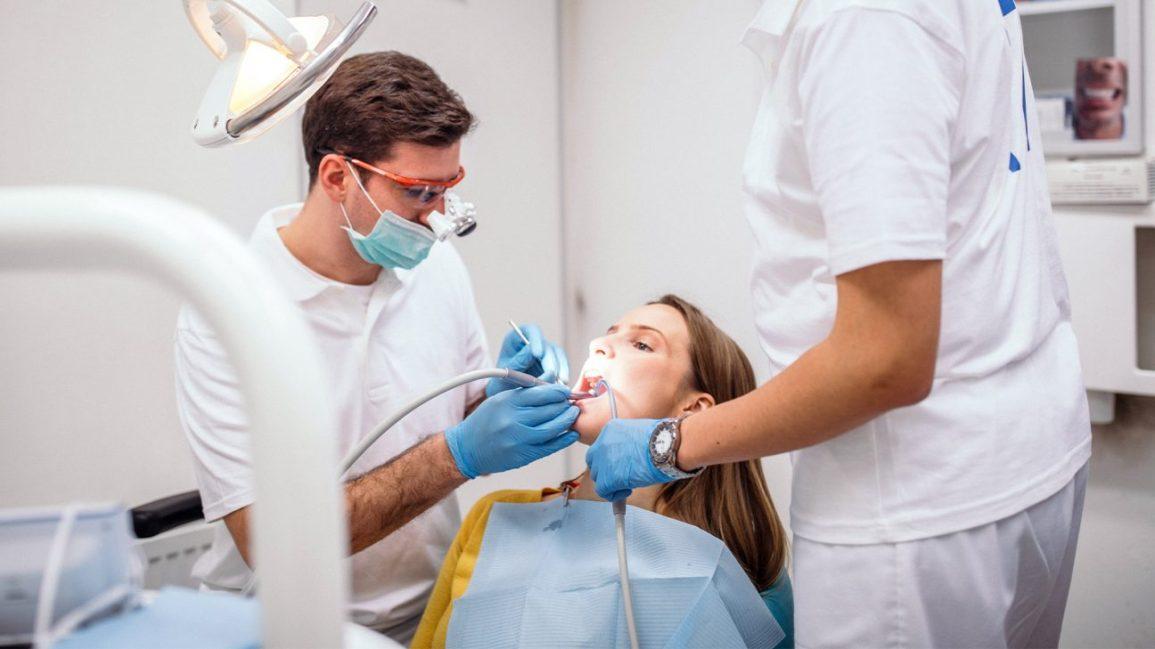A root canal may sound like a complex and out-of-this-world term. On the contrary, it is a dental procedure performed on teeth to save them from loss. Root canal treatment is offered in dental clinics across the world. It is one of the most popular dental procedures globally. Nairobi sterling dental clinic has taken over the mantle as the best dental clinic in Kenya, It brings you services such as root canal treatment at a friendly and affordable cost.
What is root canal treatment?
Root canal treatment is also called endodontics. Bacteria may attack a tooth, cutting through the enamel and the dentine. These bacteria may eventually reach the pulp and internal nerve, and attack them. Root canal treatment is designed to eradicate bacteria from an infected root canal. It is also used in preventing reinfection of the tooth and saving teeth that would have been lost. A root canal involves a series of steps that will aid in the clearing of the inflamed pulp. The treatment also involves cleaning the cavities and sealing them to prevent reinfection.
What happens during a root canal treatment?
A modern root canal treatment, at the Nairobi Sterling dental clinic, is nothing like those old sayings! It’s very similar to a routine filling and can usually be completed in one or two appointments. However, this depends on the condition of your tooth and your circumstances. Getting a root canal is relatively painless and extremely effective. You’ll be back to smiling, biting and chewing with ease in no time.
What is the structure of the tooth?
The physical structural part of the tooth consists of a white layer called enamel and a hard layer called dentin. Below the dentine, is a soft layer called the pulp. The pulp is made up of blood vessels, nerves and connective tissues. These aid in the development and growth of the tooth. They feed the tooth with blood supply, oxygen and nutrients. When the tooth has developed, it can however survive without the pulp. This is because it continues to be nourished by its neighbouring tissues.
How is the pulp infected?
Many bacteria live in the mouth, especially when one fails to observe proper dental hygiene. These bacteria find their way to the pulp through extended decay, cracks due to injury or chipping on the tooth. Teeth that have undergone repeated dental procedures such as filling are disadvantaged as they can easily be infected. Trauma to the face or teeth is another reason that leads to easy infection of the pulp. Once the pulp is infected, it cannot heal itself. It requires mitigation through a medical procedure to save to tooth. This is where endodontic treatment comes in handy.
What are the effects of infections on teeth?
Infections on the pulp cause nerve irritation. This leads to inflammation of tissues inside the tooth and consequent swelling. The tooth also becomes excruciatingly painful. Infections may also affect the root and pus-filled pockets form on the root end of the tooth. In addition to this, contamination may also cause bone loss at the tip of the tooth’s root. They may also form drainage problems leaking outwards from the root. Moreover, they disorient the dental nerves, making the tooth sensitive to changes in heat and pressure. This makes the toothache and causes discomfort, which isn’t a pleasing experience at all.
How do you know if you require a root canal treatment?
There are several symptoms of pulp infections. These include pain when eating, drinking or biting and the occurrence of loose teeth. If untreated, the infection progresses, causing more damage to the pulp and killing it gradually. These symptoms cease to appear for a while, creating a false allure that the infection is managed. The bacteria spread all through the tooth, and more severe symptoms show, such as:
- Pain when chewing returns
- Pus oozing from the infected tooth
- Swollen cheeks or jaw
- Swollen gums near the infected tooth
- Darkening of the infected tooth
What do I need to do before getting a root canal treatment?
At the Sterling dental clinic, we shall require you to consult with our specialists regarding the ailment. The orthodontic will perform a physical examination of your mouth to assess the damage. He then takes a visualization of the condition by the use of our digital dental X-rays. The X-ray images help him access the hidden details clearly and assess the damage. He then comes up with a medical report based on his findings. The findings help him in advising you and deciding if a tooth canal is the best option for you.

How is the root canal treatment done?
The treatment involves a series of steps. These are:
- Aesthetic– the medics will place a meagre amount of numbing medication on the area under treatment. Once it has taken effect, local anaesthesia is injected into the gums. You may feel a little pinch or burning sensation, but it subsides quickly. The anaesthesia is meant to prevent pain, keeping the procedure as pain-free as possible. In case you struggle with dental anxiety, we could sedate you throughout the procedure, although ideally, one is kept awake.
- Dental dam placement- the medic places a small rubber dam over the area, to isolate the tooth and keep it dry during the procedure.
- Access hole- the endodontist makes a minor opening on the crown of the tooth to access the pulp.
- Pulp removal- the specialist uses tiny dental instruments called files to remove the pulp chamber. They ensure that all the debris material is removed.
- Shaping of the canals- after removal of the pulp, the pulp chamber and root canals are cleaned, shaped, and disinfected with antibiotics.
- Filling the canals- The specialist then fills the empty canals with a flexible, rubbery dental material called gutta-percha.
- Sealing the tooth- The medics then place a temporary dental filling to seal the tooth and prevent bacteria from re-entering. This helps increase healing and prevent reinfection.
- Placing final restorations- After the temporary filling heals, we then recommend a permanent filling for the tooth. We also recommend that you get a dental crown to protect the treated tooth and aid in the restoration of normal bite. At our clinic, we have the necessary equipment to custom-make your crowns. We make a crown that fits well and suits your dentation best. It takes about 3 weeks for the crowns to be made and fabricated fully.

Does a root canal hurt?
Most people believe that root canal treatment is painful, which is contrary to the truth. The procedure is done painlessly and with a lot of care and precaution measures being taken. Our experts use anaesthesia to prevent any pain during the procedure, so you can be sure of a pain-free experience. You might experience slight discomfort, however, but this cannot be compared to the pain and anguish caused by the infection on the untreated tooth.
What should I expect from a root canal treatment?
While you shouldn’t have significant pain after a root canal, you may notice sensitivity for the first few days. These symptoms are normal and can be successfully managed with prescription or over-the-counter pain relievers. In most instances, side effects lessen within one to two weeks.
How to take care of teeth after a root canal treatment?
It may take about 2 weeks after your treatment before you get your crown to complete the treatment. During this period, we recommend that you eat soft foods to avoid hurting the tooth. Good oral hygiene is a primal requirement and one is expected to brush their teeth after every meal. One can also floss them, but correctly. You should also ensure you schedule regular tooth cleaning sessions with your dentists, and remain committed to attending them.
What complications may occur?
Our specialists perform all root canal procedures with precision, taking into account all care and precautions measures. However, any treatment method may have some ensuing complications, in case the procedure fails. Orthodontic treatments are no different. Some of the complications that may occur include swelling, pain in the treated area and swollen gums. One may also notice pus or damage from the tooth and develop a sinus problem.
What are the benefits of root canal treatment?
Root canal treatment helps save infected teeth, that would have otherwise been lost. It also helps prevent infections from spreading to other teeth, keeping them safe. Endodontic treatment helps save the jawbone, as it reduces the risk of the jawbone being damaged by infections. Moreover, it eliminates the need for tooth extraction and saves one from seeking other expensive treatments. It is cheap and highly effective, having a 99% success rate. It also involves fewer complications and can be done in simple steps, with minimal visits to the orthodontist.
What is the cost of root canal therapy?
As one of the best dental clinics in the country, Nairobi Sterling dental clinic is committed to offering accessible healthcare services. We, therefore, ensure that our services are cheap and affordable, without compromising our quality of service. Consult with your specialist and they will guide you on the cost, depending on the procedure, tests and medications. You can however rest assured that costs are economical and within financial reach.
A takeaway note from Sterling dental clinic.
Root canal problems are painful and uncomfortable to live with. No one should live with such a predicament. Nairobi sterling dental clinic offers a remedy for this and other dental problems. We have a wide range of services that will help you reclaim your dental health and improve your life. Visit us today at the Park Suit Building, in Parklands Nairobi and experience our amazing services. You could also contact us to book an appointment with our specialists. Nairobi sterling dental clinic, offers you a better smile, better teeth and better health to facilitate a better life.

